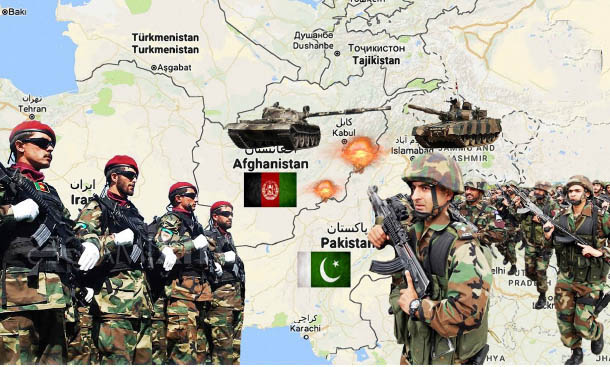Though Afghanistan and Pakistan has been struggling to end the ongoing conflicts between the two countries but never resulted to a practical outcome.Pakistani officials including the top authorities welcomed Ghani’s vision for peace and reconciliation in Afghanistan and his offer of peace talks to the Taliban militants. Both parts described terrorism as “a common enemy” and “agreed not to allow their soils to be used for anti-state activities against each other. Whilein practice, insecurity has been increasing and bombing also continued in Afghan provinces bordered with Pakistan.In response to this, Pakistan’s Foreign Ministry always rejected the allegation as baseless and was justified that operations had been conducted against originally Afghanistan-based militant groups on the Pakistani side of the border, not the Afghan side. As a result, the blame game caused a lot of hatreds and complexity between the two countries, even effected the daily exports and imports of small or large businesses between people of two countries.
It was articulated by the President of Afghanistan that Pakistan is in an unannounced war with Afghanistan which means that peace with the Taliban is not possible without peace with Pakistan; initially, we need to resolve our fundamental issues with Pakistan, then with the Taliban and other insurgent groups. Because these groups are blamed for receiving orders from the intelligence circles of that country and that’s why they cannot join the peace process until they are allowed. Thus, Pakistanwas accused by other national and international stakeholders for not being honest in fighting against terrorist and also in relationship with Afghanistan; they divide terrorism into good and bad, targeting only those groups that are hostile to the Pakistani government but those groups that targets Afghanistan are supported.
Therefore, Pakistan has been increasingly pressured by diplomacy and the volume of US aid has fallen to a great extent, and it will be too costly for Pakistan. after formulating a new strategy by the United States and the European Union, the authorities of these countries clearly criticize Pakistan’s actions on terrorism. America, but has taken a more explicit and sharp reaction to Pakistan and has warned the authorities that the United States can no longer tolerate Pakistan’s dual battles. However, Pakistan has been trying to shape a new coalition with Russia and Iran in the region for a year and to establish a wider economic relationship with its strategic partner, China.
Following the past ups and downs, on Monday,Afghanistan and Pakistanfinalized the Afghanistan Pakistan Action Plan for Peace and Solidarity (APAPPS) envisaging six working groups.The finalization came in the 4th meeting held at the Foreign Office between the Afghan delegation, led by Afghan Deputy Foreign Minister Hekmat Khalil Karzai and Pakistan’s Foreign Secretary Tehmina Janjua.It is hoped that framework may strengthen mutual trust and deepen interaction in all spheres of bilateral engagements. It is also a mechanism for finding solutions to bilateral areas of concern,but there were no details either about the meeting itself or the way forward.
Likewise, last Friday, a group of Pakistani religious scholars together with Afghani and Indonesian religious Ulemaannounced through a joint conference that the Ongoing Afghanistan war is illegitimate and not acceptable from Islamic view point. They confirmed that violence against civilians and suicide attacks are against Islam,stressing that no religion, nationality, civilization or ethnic group should be associated to justify violent extremism.
Pakistan and Afghanistan also agreed to avoid territorial and air violations of each other’s territory. The leadership of both countries also agreed to avoid a public blame game and use the plan’s cooperation mechanisms to respond to any mutual issues and concerns.Based on media reports, working groups will be established to implement the agreed principles and both sides will also nominate “liaison officers” for further coordination and supervision. Both sides agreed that effective and full implementation of APAPPS would contribute towards the common objectives of eliminating terrorism and achieving peace, stability, prosperity and development of the people of the two countries.
As media quoted, the previous joint working group and meetings had focused on ensuring comprehensive engagement for countering terrorism, refugee repatriation, intelligence sharing, economic development through trade and transit interaction, reduction of violence through a comprehensive re-conciliatory approach. But the next joint working groups will be formed to implement the seven principles as seton April 6 when Minister Shahid Khaqan Abbasi and President Ashraf Ghani met in Kabul, and both sides had agreed on seven key principles to operationalize working groups under a bilateral peace plan. The joint working groups will be formed of the military, intelligence, diplomats, trade officials and officials of the ministries dealing with the refugees’ issue.
Overall it is hoped that this may be the end the complexities between two countries as both sides are involved in discussions on the deployment of liaison officers (LOs) in both countries for joint supervision, coordination and confirmation mechanism about the suspects. The LOs deployment for realization of the agreed actions will be in accordance with the seven key principles of the APAPPS. the deployment of LOs, who will be military officials at the brigadier or colonel level, could be deployed initially at the embassies in Islamabad and Kabul for joint supervision, coordination and confirmation mechanism.If the LOs system makes progress, LOs could later be deployed at GHQ in Pakistan and Defense Ministry in Kabul. However, the Afghan officials have not commented in this regard so far but the Afghan foreign ministry officials had earlier said that no major breakthrough has been made during the previous talks in the format of the APPS meeting, mainly due to the circumstances surrounding the fight against the terrorism.
Home » Opinion » Will New Moves End the Complexities Between Afghanistan and Pakistan?
Will New Moves End the Complexities Between Afghanistan and Pakistan?
| Mohammad Zahir Akbari

